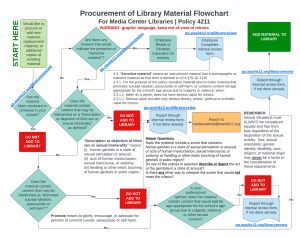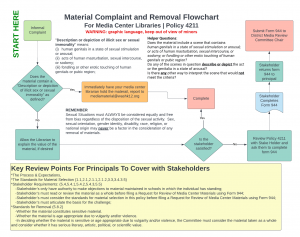Policy 4211 FAQ
HOW CAN MATERIAL BE REMOVED FROM WASHINGTON COUNTY SCHOOL DISTRICT’S MEDIA CENTER LIBRARIES?
There are three ways that material may be deselected or removed from the library:
- By following Policy 4211: Section 4.1.6, Standard ALA weeding practices.
- By following Policy 4211: Section 4.1.7, Utah Bright-line rule (Compliant with UCA §76-10-1227 and
UCA §76-10-1228, Indecent public displays) - By following Policy 4211: Section 5, Removal by Committee (Compliant with UCA §53G-10-103,
sensitive instructional materials).
Policy 4211 is based on the following legal statutes, case law, and official memos.
United States Constitution
Utah State Code
Case Law
- Feb. 24, 1969 | John F. TINKER and Mary Beth Tinker, Minors, etc., et al., Petitioners, v. DES MOINES INDEPENDENT COMMUNITY SCHOOL DISTRICT et al.
- June 25, 1982 | Board of Education, Island Trees Union Free School District vs Steven A. PICO
Official Memos
- Utah Attorney General: Official Memorandum-Laws Surrounding School Libraries
- Office of Legislative Research and General Counsel-H.B. 374 and the Office of the Attorney General’s Guidance
Washington County School District has Media Center Libraries in each school to support our student’s learning within the school setting. Our libraries offer a wide range of learning resources at varying levels of difficulty and diverse viewpoints to meet the educational needs of students and teachers and support the educational mission of the School District.
The Washington County School Board (“School Board”) acknowledges the First Amendment principle that students have a right to access ideas through School Libraries and supports the acquisition and maintenance of materials that are educationally suitable for students.
Washington County School District supports the freedom of inquiry, including intellectual and academic freedom in that every student and teacher is able to both seek and receive information from all points of view. At the same time, Washington County School District is sensitive to the reality that a School Library primarily supports the equitable access to information and the education of minors and does not serve the general public.




